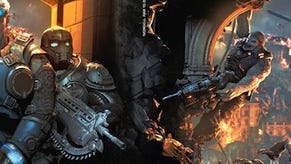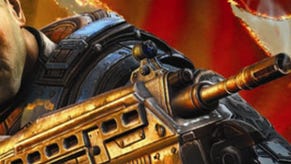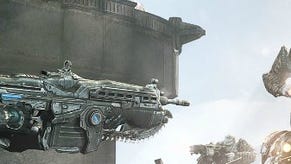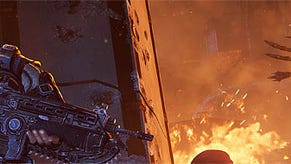Gears of War Judgment: shut up and shoot something
Gears of War: Judgment is an odd prequel that brings interesting ideas to the table. VG247's Dave Cook plays People Can Fly's first stab at the franchise to see if it stacks up with the core trilogy.
As I said last week in my God of War: Ascension appraisal, we're in the middle of 'safe season'.
It's a time where - in the run up to next-gen - studios looking to keep franchises ticking over will release low-risk filler or prequels. The same goes for Gears of War: Judgment.
When Epic Games first announced Judgment I honestly thought it would explore what life was like in the early days of the Locust war.
In my mind we'd see civilians abandoning their homes, young recruits signing up to fight an enemy they didn't fully understand, and the origin of resident wise-ass Damon Baird.
But it explores none of these things. In fact, I felt that it fell short as a narrative insight into the terrifying emergence of the Locust horde, offering only slight exposition into Baird's character or his motivation beyond what you see on-screen.
I expected more, but maybe that's my own fault when going into a series that talks in gunfire and the sound of chainsaw blades on flesh.
The campaign opens as Baird and the rest of Kilo Squad are captured and hauled into a courthouse. I won't spoil why they're in trouble, but it does involve their attempts to track and kill a Locust general named Karn. There's a lot of collateral damage in the process, and it hasn't gone down well with their superior Loomis.
Each act follows the testimony of a different Kilo Squad member, starting with Baird. It's wafer-thin stuff, but I'd be off my nut to suggest that people play this series for story alone. Of course they don't. So after having a little sulk about the lack of plot, I re-aligned my expectations and started getting into Judgment's ramped-up combat and fresh ideas.
I quickly realised that yes, this game is actually a riot. If anything it's a love-letter to the hardcore fans for sticking around all these years. It ups the enemy count considerably, increases the difficulty to a painful degree, and does everything it can to reduce you to a quivering wreck. You'll certainly need your wits about you with this one.
The more I dwell on it, I think you need to view the game as a 'best-of' collection to fully grasp how it works. Each level can be completed in about five minutes or less, and although that sounds guff, each stage throws unique rule-sets, enemies and mechanics at you to keep things interesting. Judgment delivers a very different progression system to its predecessors.
One stage sees you battling Locust in a rich gated community, as a mansion's automated defence system pounds you with gun-fire. In another you might be defending a priceless suit of armour in a war museum, while engaging enemies in a round of Horde mode. There's even a stage with high wind that batters your squad about mercilessly.
All of this feeds into the games new star system. Just like mobile juggernaut Angry Birds, your performance is graded on a three-star system at the end of each small stage. Everything you do adds to your score tally, including gibs, executions, earning ribbons and medals, levelling up, headshots and more.
Touching Crimson Omen logos at the start of each segment lets you 'Declassify' the mission, which gives slightly more narrative - we're talking two lines or thereabouts - and additional rules. So you may suddenly find yourself restricted to pistols only, suffering a severe ammo drought, facing double enemies, or becoming blinded by smoke grenades.
While this significantly increases the challenge, your star meter will fill much quicker. So there's definitely a trade-off to be considered. There's a tangible, strangely enjoyable pressure to keep your star rating up at all times, and it adds tension to each encounter.
Once you earn 40 of the available 125 stars you'll unlock the second 'Aftermath' campaign. It takes place during Gears of War 3, and follows what Baird and Cole were up to while Marcus tussles with Queen Myrrah on Azura.
I'd say that the second campaign, while short, features more chatter among the squad and greater narrative exposition than the core Judgment plot. However, it doesn't have the star system, so it feels like it loses out a little bit. Both are highly enjoyable however.
On top of these campaigns you have OverRun mode which sees COG and Locust fighting over control points. Then there's Survival mode, which is essentially Horde but sees the COG defending an objective, a COG versus COG free-for-all mode and classic Versus play. You get a lot of content for your money.
It's strange, but People Can Fly has definitely left its mark on this game. Consider that Bulletstorm was a shooter wrapped around a skill chaining mechanic, and you can see that Judgment's star system bears some similarity. It's violent, brash and keeps in line with the games that precede it.
Unlike God of War: Ascension, this is a prequel that tries something really different in its approach. There's even a handful of new weapons in there, courtesy of the Union of Independent Republics faction. The Russian-themed 'Booshka' launcher fires, steel balls of bouncy, exploding death, while the Markza sniper rifle is a high-velocity thing of death. New content for the win.
Personally, the narrative is still a problem, even if it does disclose a few interesting nuggets towards the end. The characters don't seem to give much insight beyond a few lines of exposition at the start and end of each stage.
Baird isn't explored as much as I'd have liked, Sofia's weak back-story involves an alleged affair with a superior, and Cole rarely shouts "Wooo!", which makes me a little bit sad inside. The deepest character by far is newcomer Paduk, a UIR soldier who was permanently scarred by a COG Lightmass bomb during the Pendulum Wars.
He scoffs at the decadent nature of COG-controlled cities, comes from a poor, battle-hardened past, and wears a huge chip on his soldier. There's an interesting story here, but it's scarcely explored. I felt it was a wasted chance.
I also feel that a lot of gamers will really dislike this strange, bite-sized approach to Judgment's level structure initially. It certainly took me a while to get used to, as the fragmentation kept me from feeling as immersed as I did in previous games. Once you get used to it however, you'll love the way it increased the tension of each encounter.
But cheer up folks, because this is still a superb Gears of War game that ups the challenge and madness considerably. The exposition may be weak, but once the characters shut up, just switch your mind off, grab your Lancer and start shooting something. Oh, and bring friends.
Disclosure: To assist in writing this article, Microsoft sent Dave a copy of Gears of War: Judgment. The Xbox 360 exclusive launches on March 19 in the US and Australia, and March 22 in the UK and Europe.












